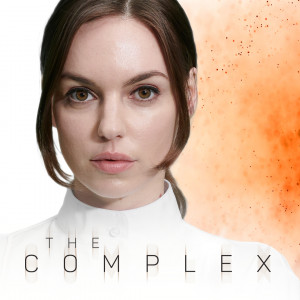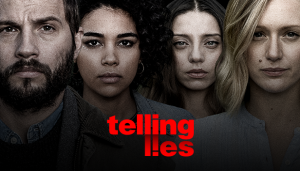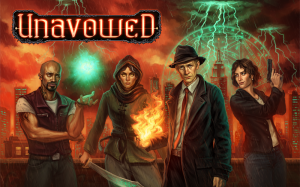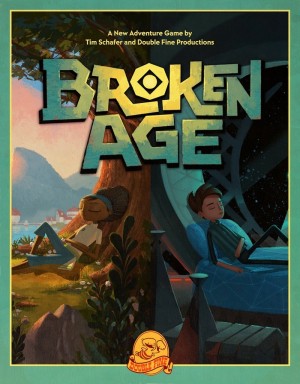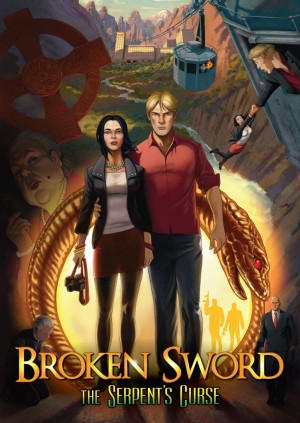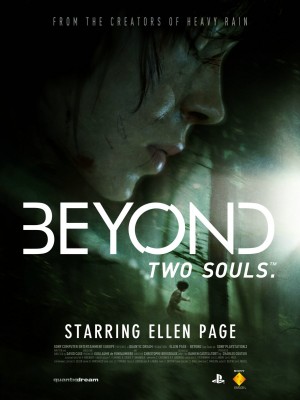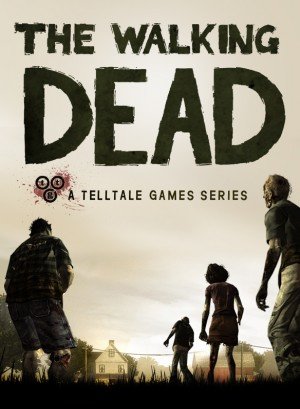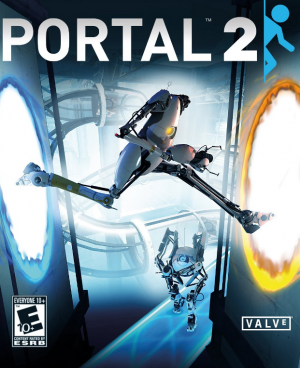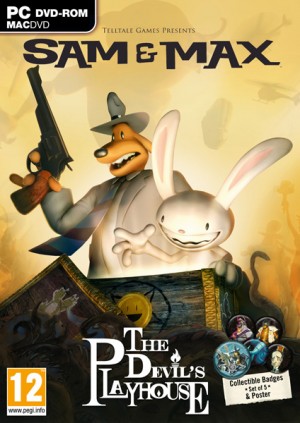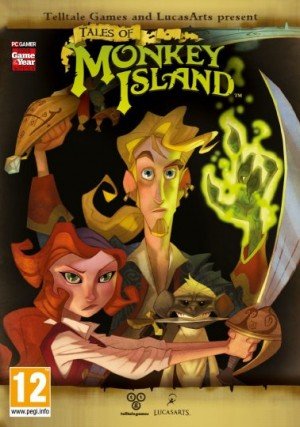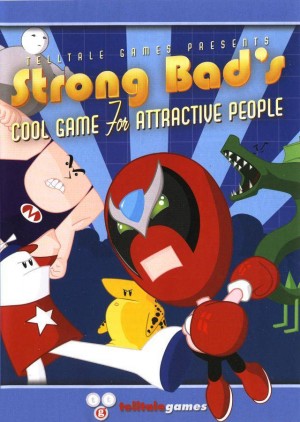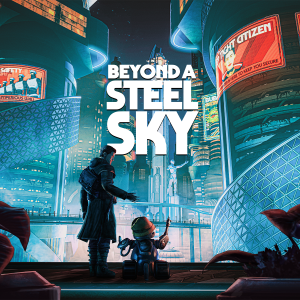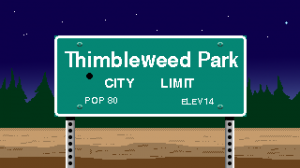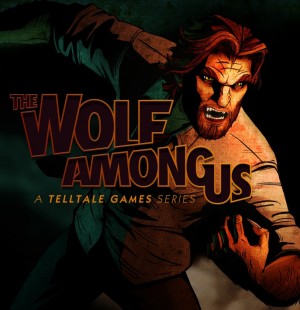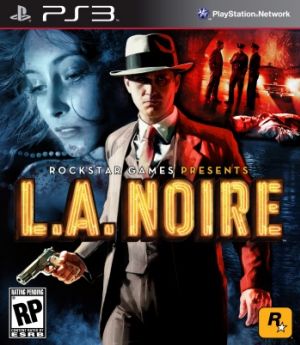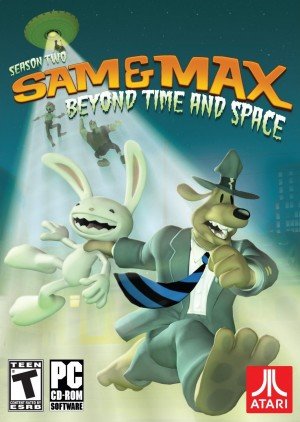Best Acting (Voice or Live Action)Aggie Award Winners

Often under-valued by publishers but never by gamers, good acting can enhance a player’s investment in characters as surely as poor acting can ruin it. With so much international localization, voice-overs can be difficult to skillfully oversee, but any game benefits greatly from proper direction and believable acting. Live acting, meanwhile, adds an entirely new realistic dynamic, but the added realism makes it that much harder to pull off successfully. This category refers to the overall quality of performances in a game, not to individual characters.
» Aggie Awards - category overview
The Aggie award winners:
The Complex (2020 winner)
You might think live-action adventures have an unfair advantage over those that rely solely on voice-overs for this award, but given the reputation of many FMV games over the years, the opposite might actually be true. The potential benefit may be greater, but so is the challenge that few games can successfully meet. Enter The Complex, an interactive movie that takes place in a maze of labs considered a “womb of scientific advancement” near London. Corporate leader Nathalie Kensington (Kate Dickie, Game of Thrones) warns nanocell technology specialist Dr. Amy Tennant that the facility may be harboring a biohazard. Dr. Tennant (Michelle Mylett, Letterkenny) is young, brilliant, and a tad overconfident. Mylett flawlessly portrays the protagonist’s ruthless passion for the truth, somewhat softened (if directed by certain player choices) by charmingly credible gestures of compassion and reassurance.
She is joined by jaunty, smart and satirical Dr. Rees Wakefield (Al Weaver, best known for his role as the conscientious cleric in the British series Grantchester), who aces his performance as a less-than-conscientious rogue scientist with suspect scruples. Weaver aptly embodies genius-level tech expertise and delivers perfectly timed comedic jabs that roil the atmosphere of desperation in the lab. Secondary but no less believable cast members display pathogenic symptoms of spasms, confusion, and pain. Scenes of conflict and discovery unfold at a steady clip: frustration when solutions don’t pan out, snide satisfaction when hacking reveals secrets, and tense communication with administrators in their “safe” distant office. Real emotional range is needed at times, too, as player decisions can result in exultation or anguish, interspersed with occasional spurts of realistic violence. For showing us a fascinating portrayal of life-or-death choices, sky-high ambition and brave self-sacrifice, Good Gate Media and Little Jade Productions and a stellar cast of thespians land this year’s coveted Best Acting Aggie.
2020 winner of:
2020 Readers Choice' winner of:
- No awards won
Telling Lies (2019 winner)
Many a box office bomb has shown us that the mere presence of Hollywood talent is no guarantee of quality. But the right actors in the right roles sure goes a long way, as was clearly on display in the FMV political thriller Telling Lies. Headlined by Logan Marshall-Green, Alexandra Shipp, Kerry Bishé and Angela Sarafyan, whose collective credits include the likes of Spider-Man: Homecoming, Dark Phoenix, Argo and Westworld, the follow-up to Sam Barlow’s Her Story featured an outstanding roster perfectly suited to their characters. Supported by an excellent script, each performer manages to command attention even during the many video clips without a scene partner, carrying out their half of a video chat conversation directly into a camera. Able to believably emote in response to their unseen counterparts and consistently delivering poignant scenes that range from singing a lullaby to a child, to threatening blackmail, to recounting traumatic stories from the past, the cast of Telling Lies was an easy pick for Best Acting Osc… err, Aggie this year.
2019 winner of:
2019 Readers Choice' winner of:
- No awards won
Unavowed (2018 winner)
With a great story full of memorable characters, there was still one ingredient left to make the cast of Unavowed a smashing success. Fortunately, Wadjet Eye is no stranger to excellent voice acting, continually casting talented actors and providing just the right direction, and this game proved no exception. Demon exorcisms, tortured dragons, and suicidal elementals could so easily have come off as hokey and forced, but here they are all colourfully and vividly brought to life. With a diverse mix of veteran performers like Shelly Shenoy, SungWon Cho and studio staple Abe Goldfarb, along with newcomers such as Julia Park and Ally Murphy, to name just a few in a uniformly remarkable cast, these actors needed to be at the top of their games to make us believe the otherwise unbelievable. To say that they managed this would be an understatement; to say that they did so at an award-winning level for Best Acting is not.
Really nothing less would have sufficed, as each character has been given a degree of humanity often lacking in pixelized avatars, with fleshed-out backstories and intense personal experiences including alcoholism, tragic self-sacrifice, and overwhelming guilt. From heartbreak to rage to hilarity, these actors had to be prepared to run the gamut of emotion, and they delivered with aplomb. Arielle Siegel’s performance as Vicki Santina, the tough-talking Staten Island detective, is both humorous and poignant, reminding us that even cops have softer sides – when they’re not standing up to monsters. As Calliope, Abigail Wahl conveys the perfect balance of spacey flower child and hyper-intelligent Muse, longing to bask in her newfound joy of living among us. They all feel like real people (or genies, or spirits, or ligamentals) with real problems, so we care about their fates and agonize deeply over the choices we must make on their behalf. And then of course there’s Ivy Dupler, who is so good in four different roles that we invited her to narrate our Aggie presentation this year!
2018 winner of:
The Infectious Madness of Doctor Dekker (2017 winner)
The Infectious Madness of Doctor Dekker
With most games, acting is only a minor part of the whole, and it has to really stand out (for good or ill) to be memorable amid all the head-scratching, McGuffin-hunting and fetch-questing that makes up the life of a modern adventurer. And often it’s only heard, the visual element left to animated sprites to convey on-screen. D’Avekki Studios’ The Infectious Madness of Doctor Dekker, by contrast, focuses solely on its characters throughout, without so much as a change of scene to distract you from the real human patients sitting on your couch, baring their souls in live-action, full-screen video. The experience stands or falls by the quality of its acting, and it's a testament to all those involved that the end result is so compellingly unsettling. Many of them have budding careers in TV and film, and it shows.
As a psychiatrist, your subjects are some very disturbed people, with stories to tell that are by turns harrowing and bizarre. It would have been so easy to ham it up, turning this into a schlocky interactive B-movie at best. Instead, everyone here gives beautifully nuanced, almost hypnotic performances, discussing the impossible with such calm rationality that before long you're starting to doubt your own sanity instead, slipping into a parallel universe where anything's possible. They're a varied bunch, too, ranging from frigidly hostile Claire to excitable academic Professor Warwick to friendly Elin and even flirty Marianna. Doctor Dekker plays with big ideas, and its power lies in persuading you to accept these patients on their own terms, not as crazy or weird; to stop seeing them as puzzles to be solved and just relate to them as human beings. These riveting therapy sessions will suck you in and keep you coming back for more, making this game a deserving recipient of this year's Aggie for Best Acting.
2017 winner of:
2017 Readers Choice' winner of:
- No awards won
King’s Quest (2015/2016) (2016 winner)
It’s tempting to sum up our Best Acting award with just three simple words: Christopher-freaking-Lloyd! And no doubt, the heartfelt performance by the star of Toonstruck and Back to the Future (and, you know, other stuff on TV and the silver screen) went a long way to making the new King’s Quest reboot as enjoyable as it was. Ever quick with the puns, but also thoughtful and tender with his doting granddaughter, Lloyd invested the elderly Graham with a warmth and kindness that made his scenes a highlight of the series, despite never leaving his bedchambers. Not to be outdone, however, the lesser-known Josh Keaton had the much bigger, more demanding part, serving the role of younger Graham across many stages of his life. And he did so with aplomb, bouncing from hyperactive youth to fearless adventurer to bored king to grief-stricken father without skipping a beat.
But there’s far more to King’s Quest than just the king, and the rest of the cast was up to the challenge. A little star power never hurts (especially since it’s such a rarity in this niche genre of ours), so the likes of Wallace Shawn (A Princess Bride) and Tom Kenny (SpongeBob SquarePants) were welcome additions as the diminutive Manny and the Merchant of Miracles, respectively. They were joined by a who’s who of prolific voice actors, including Kari Wahlgren, Fred Tatasciore and Kevin Michael Richardson, whose television credits are far too numerous to list. And of course, we’d be remiss in not mentioning Maggie Elizabeth Jones, who gives voice to young Gwendolyn. Excellent idea to give a child’s role to an actual child – a decision that sounds staggeringly obvious but is all too often forsaken in favour of an adult delivering a cringe-worthy imitation. If we unintentionally left anyone out, that’s only because there’s no weak link in the bunch, which is precisely why this award was one of the easier picks this year, despite its tough competition.
2016 winner of:
2016 Readers Choice' winner of:
Broken Age (2015 winner)
You might be tempted to think that simply throwing Hollywood talent at a game is a guarantee of success, but we’ve all heard flat, phoned-in performances or odd choices made for name recognition over ability. In fact, casting your game and bringing your creations to life can be a tricky process, but Tim Schafer and Voice Director Khris Brown (whose partnership dates back to Day of the Tentacle) are no newbies to the process. And that’s a good thing, because when you’ve got a quirky and imaginative script penned by one of the genre greats, it’s even more paramount that the creative spark on the page is successfully transferred into speech. Broken Age achieves that with flying colours, mixing professional voice actors together with performers renowned for their silver screen roles to produce a wonderfully varied cast.
Although there isn’t a single weak link in the bunch, of course Elijah Wood and Masasa Moyo as Shay and Vella, the two leads, undoubtedly deserve the highest praise for captivating and carrying us through two very different coming-of-age stories. Wood brings both an innocence and cheekiness to his role, while Moyo sounds endearingly determined as the young woman defying all expectations in deciding her own fate in the face of relentless societal foolishness. Both actors are able to effectively convey a range of emotion, drawing the audience in and making their respective personas genuinely sympathetic. But the quality doesn’t stop there, as the supporting band of players continually brings fresh energy to the story. David Kaufman is deliciously creepy as the mysterious Marek, Jennifer Hale is sweet and protective as the smothering Mom, and Jack Black oozes his typically awesome chill as Harm’ny Lightbeard. Let’s face it: when you’re laughing at a talking spoon, you know Broken Age is a deserving winner of our Best Acting award for 2015.
2015 winner of:
2015 Readers Choice' winner of:
Broken Sword 5: The Serpent’s Curse (2014 winner)
Broken Sword 5: The Serpent’s Curse
It just wouldn't be a Broken Sword game without Rolf Saxon's instantly recognizable voice as George (or is that Georges?). The mix of wide-eyed enthusiasm, good-natured stoicism and lighthearted banter really brings George alive and turns him into a real person any of us can identify with. Recruiting professional actors for game work all too often results in phoned in performances, but not here; even after all these years, Saxon (whose diverse credits range from the Teletubbies to Mission: Impossible) is clearly having just as much fun as ever.
The same can be said for pretty much the whole cast, who bring equally serious pedigrees to their parts (with collective roles in everything from the soap EastEnders to the children's classic Watership Down, with numerous games in between) and convey a real sense of engagement and whimsy, weird foreign accents and all. With comic sparring dialogue such a core part of the series' appeal, it is always crucial that Revolution get it right. Well, in The Serpent’s Curse they nailed it once again. The other fantastic finalists certainly made themselves heard, but ultimately we found that our Best Voice Acting award had already been spoken for.
2014 winner of:
2014 Readers Choice' winner of:
BEYOND: Two Souls (2013 winner)
Could it have been anything else? BEYOND: Two Souls, Quantic Dream’s ambitious tale about the adventures of a young woman and the paranormal entity which accompanies her, boasted acting talent that few other adventures could match this year. The main character, Jodie Holmes, was played by none other than the Oscar-nominated Ellen Page, while Jodie’s mentor was played by the incomparable Willem Dafoe, whose own prolific resume includes playing Jesus Christ for Martin Scorsese and the Green Goblin in Spider-Man. The supporting cast also included considerable Hollywood talent, such as Kadeem Hardison (Cole Freeman) and Eric Winter (Ryan Clayton). Sony’s support provided the means to recruit an embarrassment of voice acting riches rarely seen in the genre anymore.
BEYOND certainly placed significant demands on the lead role, and Page was more than up to the challenge. Her ability to make players feel emotionally invested in a journey that encompasses her coming-of-age struggles as well as the harsh emotional realities of being an outsider was a revelation. Dafoe, who portrays Jodie’s mentor and surrogate father, was also equal to the task, turning in a performance that was as unsettling as it was unforgettable. Hardison’s turn as one of Jodie’s few friends was also notable for providing a believable emotional anchor throughout the game’s chaotic but fantastic story. Lead designer David Cage’s continued experimentations with video games as emotionally resonant works of art can only succeed if the talent he enlists can breathe life and immersion into his sophisticated characters, and the cast of BEYOND: Two Souls provided a tableau of relatable, sympathetic, and real personalities, earning it the Aggie nod for Best Voice Acting over some stiff competition.
2013 Readers Choice' winner of:
The Walking Dead (2012 winner)
You’d be hard pressed to find a weak link in this year's award winner for best voice acting, The Walking Dead. The script and characters are well written and engaging in their own right, but the impressive vocal performances given to the multitude of characters added an extra depth and nuance that made the game so much more memorable. Leading the pack is Lee Everett (Dave Fennoy), who is able to show both a grim and cautious attitude as well as kindness and caring when given a moment to reflect on all that’s happened to him, both before and after the zombie apocalypse. Clementine (Melissa Hutchison) is another one of the game’s standouts. Children are often dreadfully performed in adventure games, but Hutchison does such a convincing job that it’s difficult to tell that it’s an adult voicing the character. Kenny (Gavin Hammon) has a great gruff, redneck attitude that gives way quickly to the love he feels for his family. Lilly (Nikki Rapp) is torn, confused and frustrated as she tries to keep control of the group.
In fact, the entire cast is top notch, giving each character a complex emotional range no matter how small a role they play. Well, except for the undead walkers, who consistently sound mindless and hungry for flesh, never failing to raise the requisite tension when they're nearby. There are no mailed-in performances and better yet, no over-acting, which is surprising given the series' comic book origins and zombie apocalypse setting. It's easy to imagine some B-movie camp sneaking in, but there's none to be found here. And it was crucial to get the voices just right. As a game not about zombies but rather a raw human drama in the face of unspeakable horrors, an emotional connection with the ever-changing cast of survivors was imperative in making players care about their safety – a concern that often met with devastating results. With such believable and memorable performances all around, there was no doubt in our minds that The Walking Dead deserves the Best Voice Acting Aggie this year.
2012 winner of:
Portal 2 (2011 winner)
Quality over quantity would be a fitting description for the winner of our Best Voice Acting award for 2011. There may only be three notable voiced characters throughout the game, but there is absolutely no denying that each one left an indelible mark in their wake. We’re speaking, of course, of Portal 2. Returning is GLaDOS, the rogue A.I. from the original game who is once again voiced by Ellen McLain. With her computerized, pitch-modulated and yet strangely melodious voice, GLaDOS is instantly familiar as the vindictive villain at the start, but the sequel soon imbues her with more of a defensive and humane role than before, making her even more amusing and likeable for the transformation. And once again, players who see the game through to the end are treated to an entertaining musical number by the mechanical songstress (McLain is a trained opera singer, after all) herself.
But this time around, GLaDOS is not alone. Stealing (or at least sharing) her spotlight is a newcomer named Wheatley, one of her own personality cores voiced by Stephen Merchant (The Ricky Gervais Show). His witty dialogue delivered with strong Bristol British accent and stammering idiocy perfectly counterbalances GLaDOS’s cool-minded seriousness. Last but by no means least is the gruff Cave Johnson, performed superbly by the always-wonderful character actor J.K. Simmons, whose dozens of movie and television credits are too numerous to list. Encountered only in pre-recorded messages, Johnson’s impact is every bit the equal of his mechanized counterparts as the sarcastic, sociopathic founder of Aperture Science with no regard for the welfare of his employees. What makes each role even more impressive is that they are “pure” vocal performances, with virtually no distinguishing physical features or animation to support them. It’s remarkable how well this trio delivered such emotionally engaging and strangely believable characters in the least likely of places, beating out some impressive Aggie competition in the process.
2011 winner of:
2011 Readers Choice' winner of:
Sam & Max: The Devil’s Playhouse (2010 winner)
When David Nowlin and William Kasten were first announced as the voices of the new Freelance Police, there was a minor furor – they weren't the same guys who did Hit the Road, so the project was doomed from the start. No way, no how could the games ever be the same… Well, three series in and it's now hard to imagine the rabbit and dog duo without their current voices. So a lot of credit must go to the two vocal leads, but The Devil's Playhouse also had a superb supporting cast. Whether it's Andrew Chaikin as the plummy narrator or Thessaly Lerner as the sharp-tongued Baby Amelia Earhart, every voice just sounds right.
Just as importantly, Telltale clearly gives their voice actors direction as well, rather than just handing them a script without guidance (or apparently much rehearsal), an example the majority of developers could learn from. This is crucial in a dialogue-driven comedy like Sam & Max, which relies on perfect timing and convincing vocal nuance to support the snappy banter among its ensemble cast. Even the slightest missed cue or poor inflection can be the difference between a gag hitting the mark or falling flat, and this game consistently delivers. Of course, Telltale gave itself a run for its money with Puzzle Agent, as did Quantic Dream’s extensive Heavy Rain cast and Blue Toad Murder Files’ impressive one-man performance, but The Devil’s Playhouse scooped this hotly-contested Aggie for its impecabble vocal production.
2010 Readers Choice' winner of:
Tales of Monkey Island (2009 winner)
Tales of Monkey Island
He just wouldn’t have been Guybrush Threepwood, Mighty Pirate™ without Dominic Armato, Mighty Voice Actor behind the mic. Armato’s rendition of Guybrush—a consistent and believable mix of funny, heroic, and human—made us feel instantly at home in this brave new Tales of Monkey Island world. He had plenty of help, too, as the rest of the cast also gave spot-on performances month after month. Stand-outs include Alexandra Boyd as the wily and unpredictable Elaine, Denny Delk as the murderous Murray the demonic talking skull, Nikki Rapp as tough-turned-tender mercenary Morgan LeFlay, Roger L. Jackson as over-the-top first mate Reginald van Winslow, and Kevin Blackton as the comically (dare we say it?) lovable human LeChuck. And let’s not forget fan favorite Earl Boen’s surprise return as demon LeChuck—a mid-season recast that made the grand finale all the more exciting.
To claim the Aggie, however, many of the same actors had to beat out the toughest competition of all: themselves. The episodic series was only barely able to edge out the brand new vocal performances of The Secret of Monkey Island: Special Edition (plus those upstarts from Oz). But the ability to seamlessly weave old favorites and delightful newcomers alike was a major accomplishment for the current iteration, and the acting performances went a long way to making it feel like a true Monkey Island experience and a worthy successor in this highly-acclaimed (and now even higher!) franchise.
2009 winner of:
2009 Readers Choice' winner of:
Strong Bad’s Cool Game for Attractive People (2008 winner)
Strong Bad’s Cool Game for Attractive People
A look at the lengthy cast list of Strong Bad’s Cool Game for Attractive People reveals a wide variety of offbeat cartoon characters, from the unshakeably depressed Strong Sad to the incomprehensible Homsar to the toothy local proprietor Bubs, with many more in between. A look down the list beside those characters reveals, with a single exception, just one name: Matt Chapman. Yes, the co-creator of HomestarRunner.com reprises all his vocal roles from the popular web cartoon in the five-episode season of Strong Bad, with a lone contribution from Missy Palmer as the series’ primary female.
It’s rare enough for a single person to successfully pull off such an extensive vocal range, but the really remarkable thing about Chapman’s delivery is that for the most part you’d never guess it was the same person behind them all. Whether lisping as the dimwitted Homestar or mumbling unintelligibly as the animal-thingie The Cheat, the roles are completely different and sound nothing alike. For all his skill portraying the ensemble cast, however, Chapman saves his best performance for the cantankerous titular protagonist, Strong Bad himself. He’s arrogant and insulting, he’s crass and often dense… and you’ll want to listen to him all day long. Through his raspy-throated expression of disdain for everyone and everything shines a sort-of-innocence and ironically likeable core that allows you to root for him through troubles thick and thin, usually of his own making. Chapman even does other voices as Strong Bad, acting in still more personas. It’s endless! And endlessly creative, fun, and a delight to listen to, giving this largely-one-man performance the voice acting nod over all other adventures.
2008 winner of:
2008 Readers Choice' winner of:
- No awards won
Readers Choice' Award winners:
Beyond a Steel Sky (2020 winner)
Another casualty of the decades-long gap between Beneath a Steel Sky and its sequel was the availability of the original voice cast, which had to be replaced this time around. That can be a difficult hurdle to overcome for fans of a beloved work, but once again Beyond a Steel Sky was more than up the challenge, earning the new roster the reader Aggie for best acting – in this case through voice-over alone. Eric Meyers’ portrayal of Robert Foster is noticeably different than his predecessor’s, but this makes sense given the ten in-game years that have passed between adventures, while Roy McCrerey is a delight as the new Joey. The rest of the human cast is also excellent across the board, but it’s Joey’s fellow bots that really steal the show. These “d-RYDs” are as eccentrically different as they are plentiful, and each actor brings their own distinctly amusing spin to their respective roles.
Whispers of a Machine (2019 winner)
Voice-overs are a much different animal than live performances. In Whispers of a Machine, Ivy Dupler gives a remarkable portrayal of Vera Englund, the futuristic homicide detective enhanced with nanotech abilities far beyond her human capacities. Player choices make Vera’s approach either analytical, empathetic, or assertive, and her tone changes adroitly from detached to sensitive to forceful, making each aspect of her personality believable. Other cast members add their reactions, passions, and quirks to the impressive vocal mix as well, from the Recycler Guy traumatized by an organically processed corpse, to Valter the squeaky geek ventriloquist, to the coroner caustically spouting morbid wisecracks. For our readers it’s an Aggie award-winning performance all around. Take that, Hollywood!
Unavowed (2018 winner)
Every role in Unavowed, whether major or minor, is expertly performed: Mandana’s tone is matter-of-fact, with passions held carefully in check, making her intense response to over-the-top horrors even more memorable. Eli’s voice, on the other hand, is often tinged with emotion, from sarcasm to nerviness to gratitude. He comes across as a geeky Sam Spade, courageously and believably confronting the paranormal, despite his nerdy instincts. Group leader Kalash has a grizzled, gritty voice with a faint aristocratic accent, which clearly signals that he is in charge. There are too many fine actors to mention by name, but the young Violet Young deserves a special shout-out for convincingly providing entirely different voices – a notoriously difficult role even for adults to pull off. It’s ironic that the only character without a voice in Unavowed is YOU, but that’s okay when every other cast member helps contribute to another clean sweep of staff and reader Aggies alike.
Thimbleweed Park (2017 winner)
Thimbleweed Park
Well, yahoo-a-reno for Thimbleweed Park! Who needs live-action, after all? Apparently not you readers, who were mightily impressed by the collection of voice talent on display here. No matter how well a character is written, it takes the right direction, the best actor to get the most out of the role – and the odder the personality, the truer that is. Considering Ron Gilbert and Gary Winnick’s first collaboration didn’t even have voices, it was no sure thing they’d be able to seal the deal this time around. But the cast is uniformly excellent, from the grizzled, cynical Special Agent Angela Ray to the cantankerous Ransome, the cursing-censored, Krusty-like costumed clown. Each actor’s voice suits their online persona to a “T”, with their own distinctive quirks and mannerisms and sayings that truly make them unique. In fact, the cast was SO good, the developers sent them back into the studio after launch to record extra conversations amongst the playable protagonists. Now that’s going above and beyond the call of duty, and is well worth an Aggie for their efforts.
King’s Quest (2015/2016) (2016 winner)
Everyone all together now: “Christoper-freaking-Lloyd!” (And all the others mentioned above.) Well, maybe not everyone, as this was one of the most hotly-contested reader awards among all five finalists. Ultimately, though, like AG staff, you just couldn’t resist the siren call of King’s Quest’s stellar roster of actors. Hollywood talent is no guarantee of success, as voice acting is a very different animal than live performances. But The Odd Gentlemen wisely cast actors experienced in the recording studio, and it paid off with superb performances all around. Classic Sierra may have been hit-or-miss with its vocal talent at times, but there are no such downsides in this episodic reboot. (Hear, hear!)
Broken Age (2015 winner)
With Her Story and Contradiction helping to make FMV a thing again, this year we had to broaden this category from voice acting alone. Even so, the talented actors in Double Fine’s sound booth were able to claim the Best Acting award from staff and readers alike. We’ve detailed the reasons why already, but here’s the punctuation: Curtis the Lumberjack was originally just a throwaway character never intended for the final game, but was so beloved by Kickstarter backers that not only was he kept in the game, Wil Wheaton was cast as the paranoid slacker. Talk about an embarrassment of riches. C’mon.
The Wolf Among Us (2014 winner)
When listening to fairy tales as children, you probably didn’t imagine the likes of the Big Bad Wolf, Geogie Porgie, or one of the three little pigs sounding anything like Adam Harrington, Kevin Howarth, or Brian Sommer, respectively. But Bill Willingham’s Fables aren’t your grandparents’ folk heroes, and these modern day outcasts in New York are voiced to near-perfection in Telltale’s The Wolf Among Us. The cast is huge: Snow White, Mr. Toad, Ichabod Crane, Beauty and the Beast, Tweedle Dee, Tweedle Dum and more, all of them given top-notch performances that make them come to life as real characters rather than simply cartoon caricatures. The voice acting and direction deserve much of the credit for this, and with this Aggie Award, credit is duly given.
BEYOND: Two Souls (2013 winner)
It’s almost a little unfair. When the likes of top Hollywood talents like Ellen Page and Willem Dafoe take on relative unknowns in adventures with a tiny fraction of the budget, it’s probably not going to end well for the competition. And indeed, while the runners-up acquitted themselves very well in the polls, the excellent performances in BEYOND: Two Souls swept the staff and reader top voice acting honours entirely on merit, not name recognition alone.
The Walking Dead (2012 winner)
Clementine sounds like a little girl! That alone is a huge accomplishment for Telltale, as kids in games often sound like the adults they really are in the recording booth, horribly overacted to compensate. But it's not just Clem that delivers a convincing performance in The Walking Dead. The baritone-voiced Lee sounds exactly like the gruff killer-with-a-heart-of-gold-wrestling-with-his-demons that you'd imagine, and there's no letdown right through the supporting cast.
L.A. Noire (2011 winner)
What a year for quality voice acting. In a genre known for horrible localizations, it was a treat to hear Mad Men’s Aaron Staton anchoring a diverse and thoroughly rock solid cast of Hollywood (where else?) talent in Team Bondi’s historical mystery adventure. Other challengers had plenty to say about this selection, but no one made the case quite so convincingly as L.A. Noire.
Sam & Max: The Devil’s Playhouse (2010 winner)
With a casting call that included an anthropomorphic cockroach, a power-craving alien ape, a Cthulhu-like talking appendage, and a headgear-wearing teenage molegirl, you could excuse Telltale if they flubbed a part or two. But they didn’t. The Devil’s Playhouse introduced a whole new host of memorable characters, each performed to the same high quality as returning favourites like Superball, Stinky, Sybil, and Flint. Oh, and that canine shamus and hyperkinetic rabbity thing. They’re not bad, either.
Tales of Monkey Island (2009 winner)
Tales of Monkey Island
We say Aggie, you say Armato, but it all adds up to a unanimous selection of Tales of Monkey Island for the top voice acting award. Of course, the now-synonymous voice of Guybrush had plenty of help in making the latest installment such an aural delight. Both returning cast favorites and new additions delivered pitch-perfect performances, making the series every bit as much fun to listen to as it was to watch (and play).
Sam & Max: Season Two (2008 winner)
Remember the early days of Sam & Max episodes, when people complained because the original Hit the Road actors weren't involved? Apparently not anymore, because the Freelance Police trounced the competition for vocal performances in Season Two (along with the rest of a stellar cast), though Strong Bad and Overclocked tried to have something to say about it.




